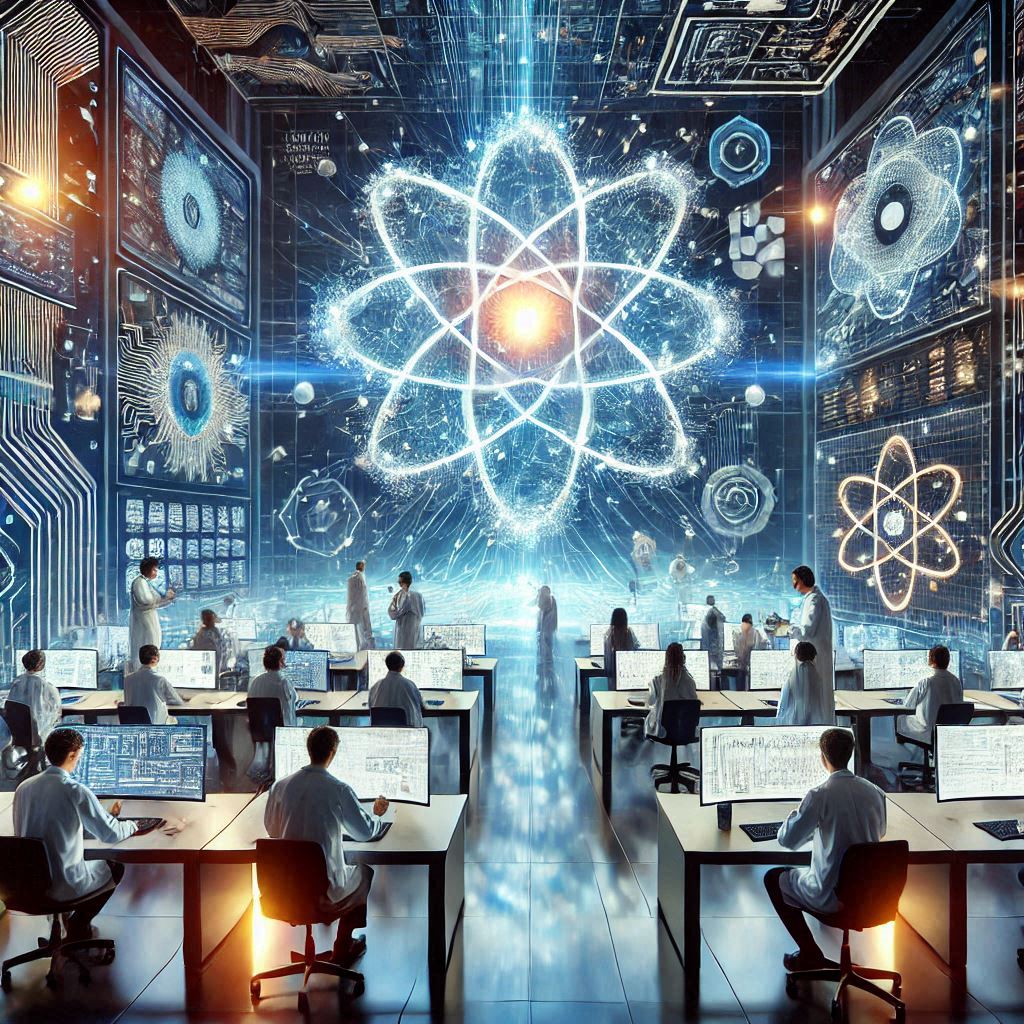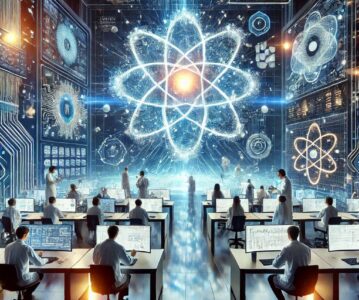Quantum computing, which harnesses the principles of quantum mechanics, has the potential to revolutionize computing by offering exponential speedups for specific problems. The impact on coding, software development, and various industries will be profound by 2025, with quantum computing offering new approaches to traditionally difficult problems. This post explores the expected transformations in coding and computing, including how quantum programming languages, hybrid systems, and quantum machine learning will shape the development landscape.

Quantum Computing Fundamentals and Its Distinction from Classical Computing
At the core of quantum computing lies the ability to perform computations using quantum bits (qubits). Unlike classical bits, which can be in one of two states (0 or 1), qubits can exist in multiple states simultaneously due to superposition. Additionally, entanglement allows qubits that are linked to influence each other, enabling them to carry out highly complex operations in parallel.
Comparison of Classical vs. Quantum Computing
| Aspect | Classical Computing | Quantum Computing |
|---|---|---|
| Data Representation | Uses binary bits (0, 1) | Uses quantum bits (qubits), which can exist in superposition (multiple states) |
| Computational Power | Linear, sequential processing | Parallel processing through superposition and entanglement |
| Problem Solving | Best for well-defined problems | Best for complex optimization, simulation, and cryptography tasks |
| Speed | Limited by classical hardware | Potential for exponential speedup in certain tasks |
| Error Handling | Classical error correction mechanisms | Quantum error correction is more complex and still under development |
Quantum Programming Languages
By 2025, developers will need to learn specialized quantum programming languages tailored to quantum hardware. These languages are designed to work with qubits and quantum gates to exploit quantum algorithms.
Overview of Quantum Programming Languages
| Quantum Language | Description | Key Features | Platform |
|---|---|---|---|
| Qiskit | An open-source software development framework from IBM for working with quantum computers. | Quantum circuit design, quantum gates, simulators | IBM Quantum |
| Cirq | A Python-based quantum computing framework developed by Google. | Python integration, quantum circuits, simulation, noise modeling | Google Quantum AI |
| Quipper | A functional programming language for expressing quantum algorithms. | High-level syntax, quantum operations like superposition and entanglement | Academic and research use |
| PyQuil | A quantum programming language designed for use with quantum processors from Rigetti Computing. | Quantum gate operations, integration with Rigetti’s hardware | Rigetti Computing |
In 2025, it is expected that these languages will evolve and become even more specialized, offering easier integration with quantum cloud platforms.
Quantum Cloud Computing
Given the prohibitive costs of quantum hardware, quantum cloud computing services will become increasingly important. These platforms allow developers to access quantum processors remotely, providing the power of quantum computing without the need for physical hardware.
Leading Quantum Cloud Platforms by 2025
| Platform | Provider | Features | Use Cases |
|---|---|---|---|
| IBM Quantum Experience | IBM | Remote access to quantum hardware, Qiskit support | Quantum algorithm testing and simulation |
| Google Quantum AI | Quantum processing with Sycamore processor, cloud-based quantum simulation | Machine learning, optimization tasks | |
| Microsoft Azure Quantum | Microsoft | A suite of quantum tools and solvers available in the cloud | Hybrid quantum-classical applications, AI optimization |
| Amazon Braket | Amazon Web Services | Access to quantum computing resources from multiple quantum hardware providers | Quantum algorithm development and execution |
| Rigetti Computing | Rigetti Computing | A cloud platform with access to quantum computers and simulators | Research and commercial quantum applications |
With cloud platforms, developers will be able to experiment with quantum algorithms and integrate them into larger applications without needing access to expensive quantum hardware.
Quantum Cryptography and Post-Quantum Security
One of the most anticipated impacts of quantum computing is its potential to break current cryptographic systems, particularly public-key cryptography. Shor’s algorithm can factor large numbers in polynomial time, a task that classical computers struggle with, rendering widely used encryption methods like RSA vulnerable. This will lead to the development of post-quantum cryptography (PQC) algorithms.
Quantum Cryptography Concepts
| Cryptographic Approach | Classical Security Methods | Quantum Impact |
|---|---|---|
| Public-Key Cryptography | RSA, ECC (Elliptic Curve Cryptography) | Vulnerable to quantum algorithms like Shor’s algorithm, which can efficiently break these systems |
| Post-Quantum Cryptography | Lattice-based encryption, code-based cryptography | Quantum-resistant algorithms designed to secure data against quantum attacks |
| Quantum Key Distribution | Traditional symmetric encryption | Uses quantum entanglement to create unbreakable encryption keys, making interception detectable |
As quantum computers become more powerful, traditional cryptographic methods will be replaced by quantum-resistant algorithms. By 2025, quantum-secure cryptography will be an essential aspect of software development, ensuring privacy and data security in an era where quantum threats are real.
Machine Learning and Artificial Intelligence in the Quantum Era
Quantum computing holds immense promise for revolutionizing machine learning and artificial intelligence (AI) by enabling faster training times and better handling of large datasets. Quantum Machine Learning (QML) is expected to make AI more efficient and capable of solving problems that are currently computationally infeasible.
Key Quantum Machine Learning Techniques
| Techniques | Classical Machine Learning | Quantum Machine Learning (QML) |
|---|---|---|
| Support Vector Machines (SVM) | Optimization problems for classification tasks | Quantum-enhanced SVMs can process higher-dimensional data and find optimal solutions faster |
| Quantum Neural Networks (QNN) | Traditional neural networks for pattern recognition | Quantum neural networks (QNNs) can exponentially speed up training and improve accuracy |
| Principal Component Analysis (PCA) | Dimensionality reduction to identify patterns in data | Quantum PCA can process large datasets faster by reducing dimensions more efficiently |
QML can potentially improve the capabilities of AI by providing better scalability and optimization for problems like data clustering, optimization, and pattern recognition.
Hybrid Quantum-Classical Systems
Quantum computing will not replace classical computing but will work alongside it in a hybrid system. These systems will leverage the strengths of both quantum and classical computers to solve complex problems more efficiently.
Hybrid System Overview
| System Type | Classical Systems | Quantum Systems |
|---|---|---|
| Classical Systems | Traditional processors handle everyday tasks efficiently. | Quantum processors handle specific problems such as optimization, simulation, and large-scale data analysis |
| Hybrid Quantum-Classical Systems | Utilize quantum algorithms for specific tasks like optimization | Use classical systems for routine operations, combining both for better performance in specialized applications |
Hybrid systems will allow developers to design applications that leverage the processing power of quantum computers while still utilizing classical systems for tasks that do not require quantum capabilities.
Real-World Applications of Quantum Computing
By 2025, quantum computing will be implemented across various industries, bringing real-world applications to life. Some of these include:
| Industry | Application | Quantum Impact |
|---|---|---|
| Pharmaceuticals | Drug discovery, molecular simulations | Quantum simulations can model complex molecules more efficiently, accelerating drug discovery |
| Finance | Portfolio optimization, fraud detection | Quantum algorithms can perform complex calculations quickly, optimizing portfolios and detecting anomalies faster |
| Logistics & Manufacturing | Supply chain optimization, route planning | Quantum algorithms can solve large-scale optimization problems, improving efficiency in supply chains |
| Energy | Energy grid management, optimization of power distribution | Quantum algorithms can solve complex optimization problems to enhance energy efficiency and distribution |
The Developer’s Journey: Adapting to Quantum Computing
As quantum computing becomes more mainstream, developers will need to adapt by learning how to work with quantum algorithms, programming languages, and hybrid systems. Traditional software engineering practices will need to evolve to accommodate quantum computing’s unique characteristics.
Skills for Developers by 2025
| Skill Set | Classical Development | Quantum Development |
|---|---|---|
| Programming Languages | Python, Java, C++, JavaScript | Qiskit, Cirq, Quipper, PyQuil |
| Algorithm Design | Sorting, searching, optimization | Quantum-specific algorithms: Shor’s algorithm, Grover’s algorithm |
| Software Architecture | Classical architecture for scalability | Hybrid architecture integrating classical and quantum systems |
| Cryptography | RSA, AES encryption | Post-quantum cryptography, Quantum Key Distribution |
| Machine Learning | Neural networks, reinforcement learning | Quantum-enhanced machine learning techniques (QML) |
Conclusion
Quantum computing will be a game-changer in software development by 2025,
offering new computational capabilities that could unlock solutions to problems previously deemed unsolvable. From quantum programming languages and cryptography to quantum machine learning and cloud computing, the landscape will shift dramatically. For developers, adapting to this shift will require mastering new tools, languages, and hybrid systems that integrate both classical and quantum computing. As quantum hardware continues to evolve, the world of programming will become much more powerful, opening new avenues for innovation across industries.
By 2025, quantum computing will not just be a theoretical concept but an essential part of mainstream software development. The future promises exciting advancements that will redefine how we approach computing challenges.
Discover more from lounge coder
Subscribe to get the latest posts sent to your email.


